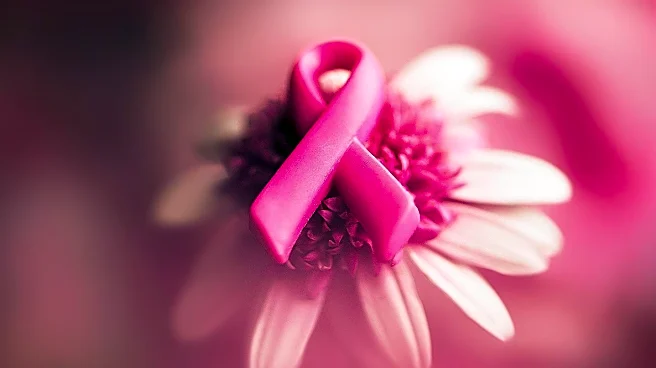What's Happening?
Mavis Bennett, a survivor of vulval cancer, is urging women to be vigilant about potential symptoms and to seek medical help without embarrassment. Bennett, who resides in Somerset, experienced vaginal irritation for weeks before consulting her GP. A small boil or abscess led to her referral to a specialist, where she was diagnosed with vulval cancer by the gynaecology team at Royal United Hospitals Bath (RUH). Bennett underwent two surgeries to remove the cancer, with the first operation being successful. However, the cancer returned a year later, necessitating a second operation at Southmead Hospital in Bristol, which included a skin graft. Bennett emphasizes the importance of early diagnosis and treatment, encouraging women to consult their GP if they experience unusual symptoms such as lumps, sores, growths, bleeding, or persistent itching.
Why It's Important?
The advocacy by Mavis Bennett highlights the critical need for awareness and early detection of vulval cancer, a condition that can be overlooked due to embarrassment or lack of knowledge. Early diagnosis significantly improves treatment outcomes, reducing the physical and emotional toll on patients. Bennett's message is particularly vital in encouraging women to overcome the stigma associated with discussing gynecological health issues. This can lead to more timely medical consultations and potentially save lives. The broader impact includes increased public awareness and potentially more resources allocated to women's health initiatives, emphasizing the importance of regular check-ups and open communication with healthcare providers.
What's Next?
Bennett's advocacy may inspire healthcare campaigns focused on educating women about vulval cancer symptoms and the importance of early detection. Medical institutions might increase efforts to provide accessible information and support for women experiencing gynecological health issues. Additionally, there could be a push for more research into vulval cancer to improve treatment options and outcomes. Healthcare providers may also consider implementing more comprehensive screening programs to catch such conditions early, potentially leading to better patient education and support networks.
Beyond the Headlines
Bennett's story underscores the cultural and societal barriers that often prevent women from seeking timely medical advice for gynecological issues. Addressing these barriers requires a shift in public perception and healthcare practices, promoting a more open dialogue about women's health. This could lead to long-term changes in how gynecological health is approached, with increased emphasis on education and destigmatization. Furthermore, Bennett's experience may encourage other survivors to share their stories, fostering a community of support and awareness.









